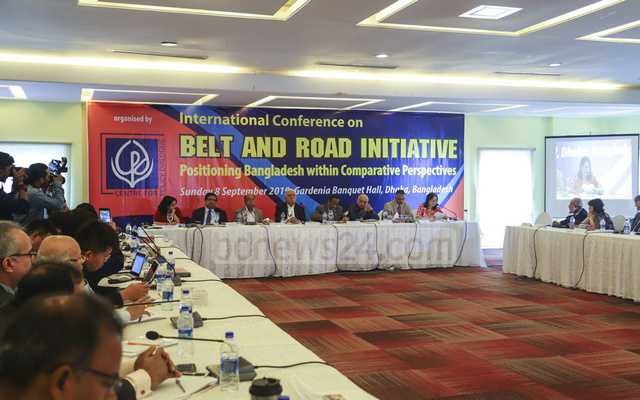Bangladesh stands to gain more from Dhaka-Beijing FTA: Chinese expert

Image collected
“China-Bangladesh FTA agreement can bring more Bangladeshi products into the scope of tax exemption, effectively alleviate the bilateral trade deficit between Bangladesh and China,” Prof Cheng Min of the Institute for Bangladesh Studies of the Yunnan Academy of Social Science, Kunming, says.
“On the other hand, it also lays a good foundation for promoting the construction of "Bangladesh, China, India and Myanmar" economic corridor,” she said, speaking at an international conference on the belt and road initiative (BRI) in Dhaka on Sunday.
She tried to give an overview of the feasibility and countermeasure analysis of the signing of the China-Bangladesh FTA and allay possible concerns.
“At present, China's competitive advantages in steel, non-ferrous metals, building materials, railways, electricity, chemical industry, automobiles, communications, construction machinery, aerospace ships and marine engineering will hardly impact Bangladesh, because Bangladesh's industries are just starting.
“According to Liszt's theory of infant industry, a lot of imports and foreign investment are needed at this time. Due to the rising labour costs, it is also difficult for China's homogeneous ready-made clothing products to impact Bangladesh,” Prod Min said.
Bangladesh does not have free trade agreement with any country.
In October 2016, during Chinese President Xi Jinping visit to Bangladesh, the two sides agreed to launch a feasibility study on bilateral free trade area. Bangladesh also joined his flagship BRI during that visit.
Prof Min said Bangladesh is an “important partner” of China in South Asia, and the establishment of the FTA will not only benefit the two countries to carry out economic cooperation, but also will have a “positive impact” on the BRI construction.
The bilateral trade of $16.4 billion in 2017 grew with an average annual growth of 20 percent since 1975 when China established diplomatic ties with Bangladesh. It is heavily in favour of China. In 2018, China's direct investment in Bangladesh was $228 million.
“Since the establishment of diplomatic ties, bilateral trade investment between China and Bangladesh has been growing rapidly, but Bangladesh has been running a large deficit in goods trade with China.
“The Trade Integration Index between the two countries also shows that Bangladesh has a great dependence on Chinese goods and a huge export potential to China,” she said, adding that the trade expansion effect between China and Bangladesh is “obvious”.
“The BRI has provided good conditions for the establishment of the Sino Bangladesh free trade area. On this basis, China and Bangladesh still need to make continuous efforts to take positive measures.”
For that, she suggested establishing a list of early harvesting projects. The first is cooperation in the field of garment manufacturing.
“The two countries can sign the Framework Agreement on Cooperation in Textile and Garment Industry,” she said, as clothing sector is crucial for Bangladesh's economy.
“At present, it is facing problems such as industrial upgrading, heavy dependence on imports of raw materials and intermediate products.
“After many years of development, China's textile industry already has a complete industrial chain and a relatively high level of processing, but it also faces problems of rising labour costs and overcapacity.
“China's Ministry of Commerce encourages textile and garment enterprises to take the opportunity of the "one belt and one road" to carry out industrial transfer.
“If the specific rules of cooperation between China and Bangladesh on textile and apparel can be formulated as soon as possible, it will not only meet the practical needs of Bangladesh, but also provide a path for the development of China's textile and apparel industry in the context of supply-side reform,” she said.
The second, Prof Min said, is cooperation in steel, smelting, power, road infrastructure and communication networks.
“After the list of early harvested projects has been reached, detailed implementation rules should be promulgated, including simplifying the examination and approval procedures, clarifying the channels of appeal; establishing a cooperation fund for the list of projects to provide financing support for its smooth implementation; and the government should do a good job of service and publicise the cooperative projects.
“It will introduce the cooperation procedures, relevant laws and regulations, and other issues of concern to enterprises, so as to clear the barriers for enterprises to go out.”
She said China should give Bangladesh tax-free preferential policies for more products, including polymer products, gloves, silk, cleaning cloth, leathers, lead-acid batteries and synthetic fibres.
“The proportion of clothing with zero-tariff policy should increase from 90 percent to 100 percent in order to alleviate Bangladesh's expanding bilateral trade deficit with China.”
Source: https://bdnews24.com
Previous Story
- China-financial ties can't be cut off: MOC
- Leather sector’s woes not ending soon
- FDI in apparel, textile industries
- ‘Manufacturing feeling the heat of trade war’
- 400 Bangladesh’s garment factories barred from accepting Western...
- China wants trade talks but if US wants...
- A front-runner in bike industry
- Bangladesh can reap benefit from US-China trade war